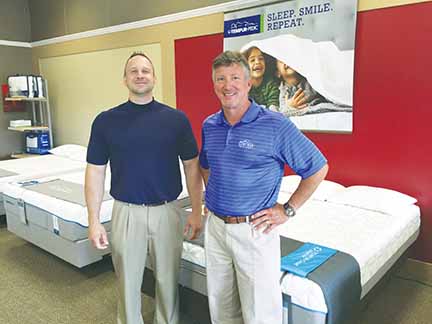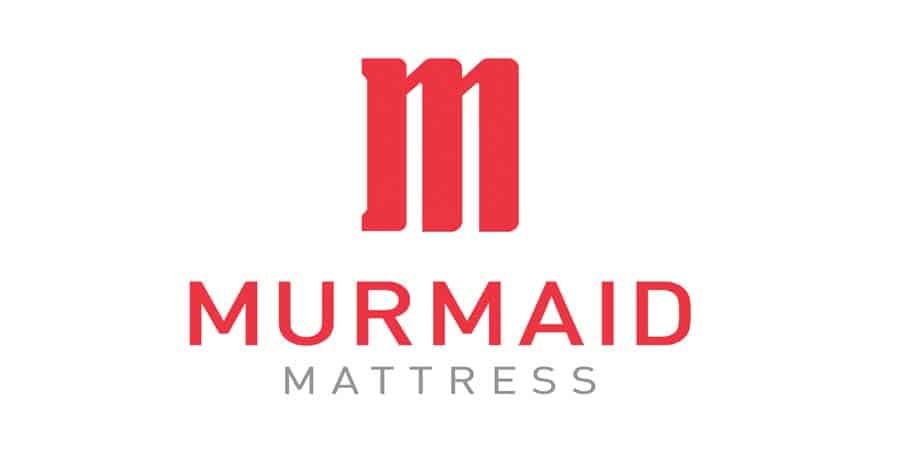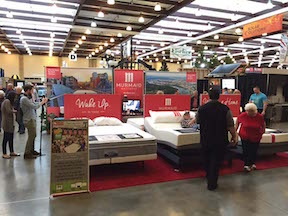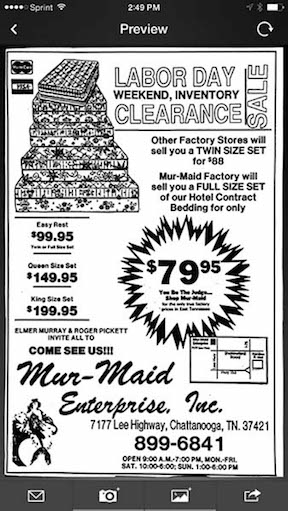Factory direct has a history of plunging into new endeavors
BY DOROTHY WHITCOMB

Management team Roger Pickett (right), MurMaid Mattress owner and president, recently has charted a new course for the company founded by his parents with the help of a team that includes sales manager Wes Gainer.
MurMaid Mattress, a multifaceted company that manufactures beds for its own retail stores and other customers, has followed a path of strategic reinvention since its founding 36 years ago. Course corrections in response to changing market conditions and consumer buying habits have spurred growth during good economic times and enabled survival when times were tough.
Now the mattress maker is addressing new market dynamics, including tech-savvy consumers and the consolidation of the bedding industry, by once again revising its business plan to reach a broader range of customers.
Elmer and Joy Murray founded the Cleveland, Tennessee-based company in 1979. The venture’s evocative name was created by combining then tweaking the words “Murray” and “made” and was meant to reflect the family orientation of the business.

New-look logo The company’s new brand mark is part of a broader freshening of MurMaid’s image that also includes a redesigned website.
Responding to market forces
For about a decade, MurMaid operated as a small regional mattress manufacturer. People occasionally would drop by the factory and request mattresses made to their own specifications. While the Murrays were happy to accommodate them, they only slowly began to see the potential in these orders.
“It wasn’t until 1990 when we visited Brothers Bedding in Knoxville, Tennessee, that we realized what a factory-direct operation looked like,” says Roger Pickett, Joy and Elmer’s son and the company’s president and owner. “Then, when we joined ISPA (International Sleep Products Association) in 1991 we learned there was an actual factory-direct business model. That’s when we started advertising directly to the public so that we could take advantage of what was already happening with our business.”
| BRIEFLY | |
| Company | MurMaid Mattress |
| Headquarters | Cleveland, Tennessee |
| Specialty | Factory-direct mattress producer and retailer |
| Founded | The family-owned company was started by Elmer and Joy Murray in 1979 as a mattress manufacturer. |
| Learn more | www.murmaid.com |
Pickett, who began working full time at MurMaid in 1989, took the company’s helm 20 years ago. Since then, he has presided over a number of changes—some have cemented the company’s viability as a factory direct; others have moved it away from the classic model. For example, in 1995 Pickett bought a local independent store called Mattress Outlet and set out to build it into a chain of specialty sleep shops. The plan was to have the stores, which were strategically located throughout the Tennessee Valley and northern Georgia, offer national bedding brands, including Serta, Simmons and Tempur-Pedic. Sales of these brands, Pickett reasoned, would supplement sales of MurMaid beds.
“In every market that there was a MurMaid store, we added a Mattress Outlet,” he says. “Essentially, we were competing with ourselves.” The strategy was successful in “keeping other people out of our market,” Pickett explains, and by 2008, the company’s roster of stores had grown to 17—eight MurMaid factory-direct locations and nine Mattress Outlets.
Like many regional suppliers, MurMaid was hit hard by the Great Recession and ongoing consolidation within the mattress industry. During the recession, the company’s 12,000-square-foot factory operated only three days a week. Sales also fell sharply at its Mattress Outlet stores. Pickett responded by closing three locations and consolidating two others. Today, the company operates seven MurMaid factory-direct outlets and six Mattress Outlet stores.
A major revamp
But that, too, is about to change. Pickett is addressing new realities in the post-recessionary bedding market by rebranding the retail stores, creating a new channel for online sales and expanding the company’s market reach. By the end of the year, all 13 of the company’s stores will carry the MurMaid name, with each store offering both national brands and MurMaid products.

Reaching customers everywhere As part of its marketing strategy, MurMaid attends events like the Tri-State Home Show in Chattanooga, Tennessee, to allow potential customers to test and learn more about the brand.
“In today’s retail climate having stores in close proximity is acceptable and helps to create dominance in the market,” Pickett says. “Competition from the national chains has hit us harder with the Mattress Outlet stores than with MurMaid. This way we can combine our advertising budgets and compete dollar for dollar with the nationals.”
Pickett has underscored his most recent course correction with a new logo and website. The site, which includes the option to purchase MurMaid-branded products online, is central to his plans to reach a younger, Internet-obsessed demographic.
“We’re reaching out to a new generation of mattress buyers,” he says. “We realized how many things, including mattresses, are bought online and thought that maybe we could get a piece of that market without having to open another store.”
iCool heats up product line
To help ensure success of the online store, the company is offering exclusive product. “We developed online versions of our iCool beds with different fabrics and a more contemporary look to appeal to a younger demographic,” says Sales Manager Wes Gainer.
The three mattress models in the iCool Classic collection available online (firm, plush and ultra plush; all with 2 inches of gel foam) retail for $799 in queen size ($999 with optional foundation). The three mattress models in the iCool Deluxe collection have 3 inches of gel foam and retail for $999 in queen ($1,199 with optional foundation).
In its brick-and-mortar stores, MurMaid offers iCool beds in both all-foam and hybrid constructions. “We want iCool to be a local brand that does everything that the major brands can do, and we’re always tweaking it to make it better,” Gainer says.
While the iCool all-foam model in firm comfort level is the company’s best-selling mattress, a recently introduced euro-top model is nipping at its heels. “We added quilted memory foam to give it a different look and feel and almost quadrupled (our iCool) sales,” Gainer says.
MurMaid also offers innerspring collections. The two-sided Lindsey group ranges in price from $599 to $1,099 for a queen set. It’s also available in single-sided versions, at slightly lower prices. The Economy line is MurMaid’s entry-level collection.
MurMaid also offers pillows, protectors and adjustable bases from brands such as Sealy, Serta, Stearns & Foster and Tempur-Pedic in all of its brick-and-mortar stores.
“Adjustable beds have changed the retail environment,” Gainer says. “We went from selling two to 60 a month and have a 50% close rate. Customers see adjustable as a lifestyle decision now.”
Not content to rest
With the retail change underway and the website launched, Pickett is ready for the next challenge, which he sees as expanding MurMaid’s hospitality business (currently a boutique hotel and some dormitories) and wholesale selling to other retailers.
“We’re just now getting our first rep on the road for hospitality sales, and we’re also talking to a couple of key retailers out of our area that do a good job,” Pickett says.

Way back when
Demand from customers convinced MurMaid, originally founded as a mattress manufacturer, to adopt the factory-direct model and sell at the retail level.
Currently, the company posts about $7 million in retail sales through its stores, but only $1 million through other channels. Pickett would like to see MurMaid’s in-house retail sales grow to $12 million and other channels to reach $6 million.
“If we work hard enough over the next five years we should make it,” he says.
The expansion rests on what Pickett believes is a key advantage: “We have the infrastructure in place and currently make 60 to 100 pieces each day. We could double that by adding extra employees.”
But there are challenges, as well.
“As a factory direct, we’re used to larger margins and don’t have the economies of scale that larger factories do,” Pickett says. “We also don’t want to lose sight of what we do best and that’s catering to our own retail stores.”
In fact, having his own retail stores has guided Pickett’s thinking about how to position MurMaid to other retailers.
“We don’t want to be the cheapest mattresses on the floor. We want to be the best,” he says. “Having retail stores has taught us that better materials cost less in the long run because there are fewer problems and returns.”
Pickett also doesn’t want to stray from values upon which his company was built. He’s proud of the fact the MurMaid was awarded the Better Business Bureau’s Torch Award in May in recognition of the company’s business ethics. Treating employees well also is an integral part of the company’s culture. Many workers have been with MurMaid for 20 years or more.
Beyond business
Pickett believes in “corporate tithing,” and MurMaid’s philanthropy extends as far as Cambodia. Through People for Care and Learning, a nonprofit organization based in the company’s hometown of Cleveland, Pickett became involved in the “Build a City Project” in Andong Village, Cambodia.
This three-year effort involved building a functioning, maintainable city for people who had been displaced from their homes by commercial development and resettled on an open field that lacked running water or a sewage disposal system. Pickett traveled to Cambodia to work on the project and then supported it by contributing a portion of the proceeds from sales of the iCool gel memory foam line for two years. In recognition of his support, a road in Andong has been named MurMaid Mattress Street.
Pickett summarizes the values that underpin his business this way: “We believe in taking care of people both inside our company and out.”




